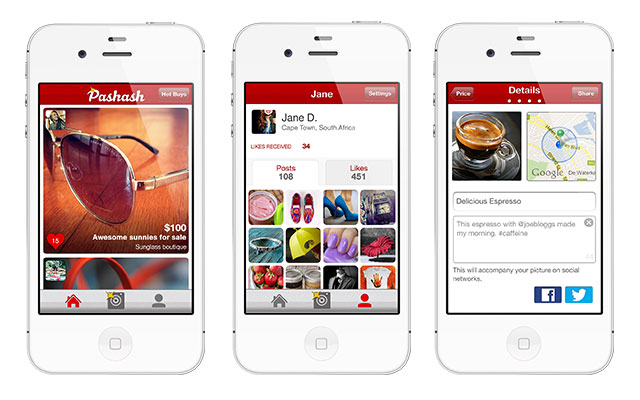
Pashash, founded by two University of Cape Town graduates, wants to provide shoppers with a place to share their favourite finds — from bargains to unusual trinkets to the latest fashions, while also letting them search the service for items they may be looking for in their area.
In addition to being one of only a handful of start-ups chosen by Google’s Umbono development programme — which is how the start-up got its first batch of funding — Pashash last week won the SA leg of the TNW Startup World competition. The founders will now get the chance to pitch their ideas at the global final of the competition in San Francisco early next year.
Cofounded by Faheem Kajee, 26, and Lawrence Webley, 22, Pashash shares similarities with services such as Pinterest and Fancy in that it’s designed to allow users to collect or curate items they like.
The difference is, rather than blog posts or images and other online content, Pashash allows users to “collect” physical, real-world items.
Users can take a picture of an item, tag it with its price and the store in which it was found, add location information and share it to various social platforms, in addition to Pashash itself. Aside from creating a list of things a user likes, they can also look for great buys in their vicinity or search for specific items and see whether anyone in their network has recommendations.
Pashash launched an application for Apple devices in mid-August and Kajee says it’s really still in beta. “The first version of the app is pretty simple, with limited functionality, because we’re trying to develop it to match what people actually want rather than throwing in superfluous features,” Kajee says.
The biggest challenge facing Pashash is getting users to post more content. Kajee says this is far more important than pure user acquisition and feedback is being used to figure out a solution.
Though the initial funding came from Google’s Umbono start-up incubation programme, Kajee says Pashash is in the process of looking for a bridge round of funding. “We want to be able to have flexibility as to the sort of monetisation methods we eventually use,” he says.

“We want to reward people for posting from stores and stores to reward us for that. Word-of-mouth and social recommendation are really valuable and there’s a lot of room for mutually beneficial arrangements with retailers. If, for example, a user sees a great pair of shoes at Woolworths and posts about it, we’d like to see Woolworths giving that user a 5% discount voucher for their next purchase or something similar.”
Because it’s a shopping network, Kajee says Pashash has enormous potential to connect users with brands. “We gain insights into what people want to buy and can then target a user who’s looking to make a purchase, say a cup of coffee or a pair of jeans, by directing them to somewhere nearby that their friends or other users have recommended.
Though stores or brands can’t create custom pages, they can create an account and post their own content to Pashash.
The application is available only in Apple’s App Store for now, but Kajee says an Android version will follow early next year. He says the service tried at first to develop for both platforms, but it wants to iron out the kinks on iOS properly before expanding it to Android.
Because the company is targeting an international audience, Kajee says there are no plans to create a BlackBerry application. “iPhone and Android are the most important because of our target audience.”
One of the advantages the application has is its ability to be picked up anywhere in the world. “It’s integrated with the Google Places database and can display items in local currency,” Kajee says. “It’s highly localised automatically. The next release will also convert measurements from imperial to metric where necessary.”
As for competitors, Kajee says users already share the sort of content Pashash wants to accumulate on other channels like Facebook, Twitter and, in the case of food and drink, Instagram. The challenge is getting them to share that content on Pashash instead of those sites, or in addition to them.
“We think of ourselves as building a Pinterest for the great buys around you,” he says. “Pinterest is about curating online while we’re curating the real world.”
Though most of the posts to the service to date have been related to fashion or food, and the fact that it’s only available for iPhones means a limited user base or target audience, Kajee says a year from now he’d like to see the service being used on a range of devices for everything from comparing prices on groceries to exclusive finds and unusual items. — (c) 2012 NewsCentral Media




